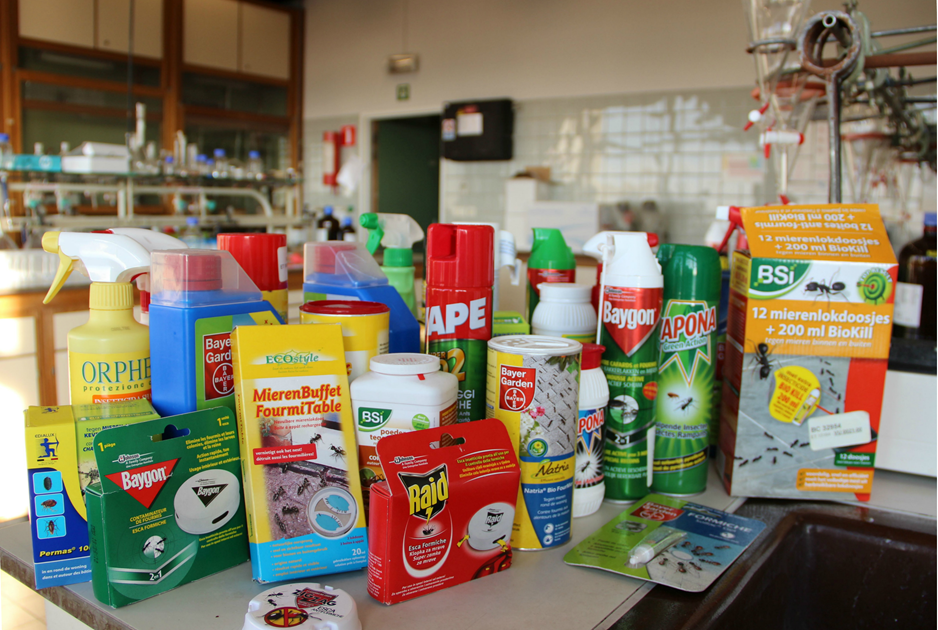Exposure to indoor insecticide sprays is much larger than via residues on food

Around 800 tons of household products to fight against insects are sold in Belgium every year. However, it appears that the indoor use of these insecticides could be more harmful for your health than initially thought. Commissioned by the Superior Health Council, professor Pieter Spanoghe of Ghent University (UGent) and some other experts investigated this matter.
The main conclusions are that this way of exposure to pesticides is much higher than the intake by residues of crop protection products on fruit and vegetables. By using insecticide sprays and lice shampoo in your house, you get 100 to 1.000 times more chemical pesticides in your body. So you better think twice before you let your children play on a floor you have used ant powder on.
Pesticides are all around us
Pesticides are usually linked to their use in agriculture, where they are deployed for battling a variety of diseases and plagues to obtain higher yields and food quality. People tend to forget that they are also used outside of agriculture. Such a use of pesticides to exterminate annoying and unwanted insects and other arthropods (spiders) often takes place in our domestic environment and at work.
Commonly used household products
In 2013, Belgians bought around 800 tons of products to combat insects, like spray cans, evaporators, strips, cassettes, bait and flea collars. The most commonly bought products are against insects (mosquitos, flies, ants, etc.), mites and other arthropods (spiders, etc.). These products contain a total of 75 tons of active substances to combat insects indoors, which is a significant amount.
Risks not always commonly known
The household user is usually not aware of the risks these products bring with them. They are also, unlike professional users, not or just barely protected during the application. The extent of exposure is hard to estimate and depends on a variety of factors, like the frequency of use, the usage of protective clothes, the dose and type of formula (aerosol, evaporator,…). For the moment it is unclear if there is a cumulative effect with other applications of similar products. That is why professor Pieter Spanoghe from the Faculty of Bioscience Engineering of Ghent University (UGent) is commissioned by the Superior Health Council to perform research to get an overview of the indoor use of insecticides and the household use of crop protection products in Belgium.
Health consequences
Intensive and long-term unsafe use of insecticides could lead to health problems, for example affecting our endocrine system. “To take this in account, government regulations already provide considerable safety measures. So the actual risk isn’t the same as the actual danger, but also takes exposure in account”, says Pieter Spanoghe. That exposure can occur in different ways. “Above all, you get these pesticides in your body through contact with your skin, especially via the hands. But also orally or by breathing, but that amount is a lot smaller.”
Children and pregnant women are more susceptible
“A thing that few people consider, is that these substances are not only dangerous for themselves, but also for family members or roommates. Kids are exposed too, for example by playing on a floor on which ant powder has been used. And for them, insecticides are even more dangerous than for adults. Pregnant women also belong to the sensitive population group with an increased risk.”
Notable: you are more exposed to pesticides by indoor use than through ingestion of food. Spanoghe: “A lot of people don’t know this, but insecticide sprays or for example lice shampoos are also pesticides. By using these products indoors, you get 100 to 1.000 times more substances in your body than by eating treated vegetables. Caution is also advised for products to treat wood or house plants.”
Protection rarely used
People who use these products indoors, are often not aware of the risks. “Unlike professional cultivators, people at home rarely use protection like a mouth masks or gloves. They use these products in shorts and a T-shirt and underestimate the health risks these product carry with them. The user compliance with clear labelling with icons that indicate the risks, is very important”, says Spanoghe.
Always be cautious
Despite strict regulations, the indoor use of pesticides is not always without risk. The Superior Health Coucil advises to always manage them with caution, or to use alternative methods like a mosquito net, UV lamps or insect traps.

